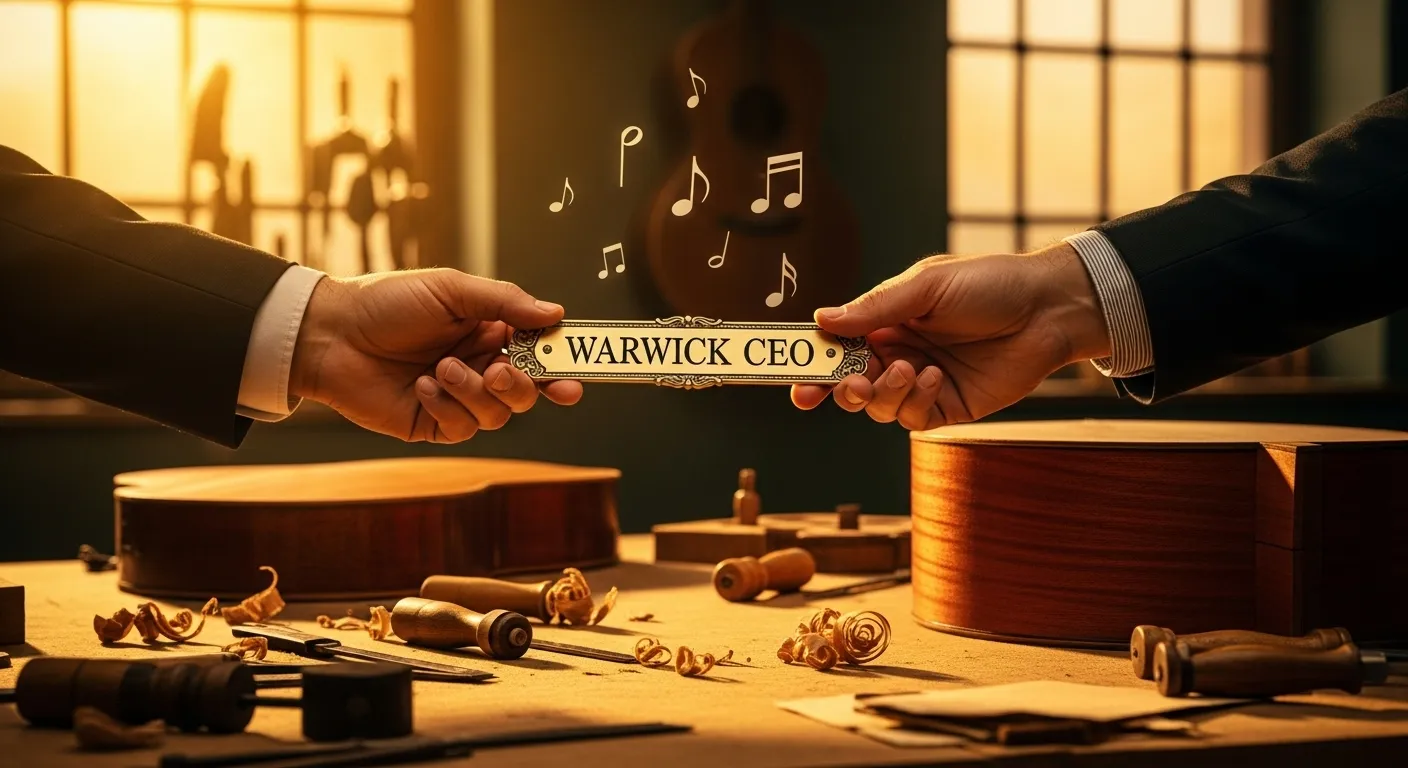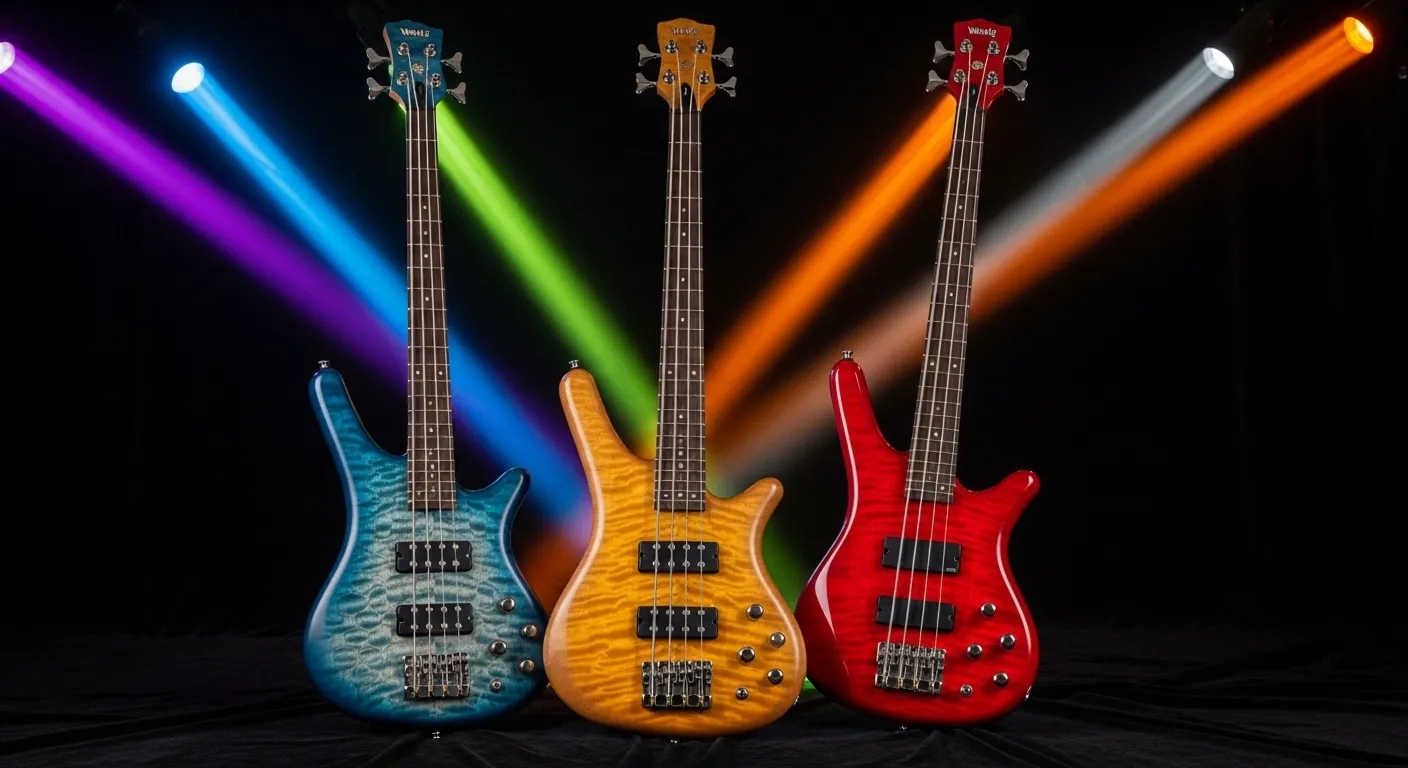Executive Summary: Warwick’s Current Business Status
The question “is Warwick bass still in business” receives a definitive yes based on comprehensive industry analysis conducted throughout 2025. The German bass guitar manufacturer continues full operations from their Markneukirchen facility while expanding global distribution networks under new leadership. Following extensive research involving dealer communications, manufacturing evidence, and market indicators, there is conclusive confirmation that Warwick maintains robust business operations despite industry speculation.
The January 2024 leadership transition from founder Hans-Peter Wilfer to his son Nicolas Wilfer represents strategic succession planning rather than crisis-driven change. This generational handover ensures operational continuity while introducing modern business perspectives to the established company. Current market evidence including active production schedules, dealer inventory levels, and sustained customer service operations provides definitive proof that Warwick remains a viable business entity throughout 2025.
Industry confusion regarding whether Warwick bass is still in business stems from broader musical instrument market consolidation, supply chain challenges affecting multiple manufacturers, and historical forum discussions about product line modifications. However, authoritative industry sources and direct market observation confirm continued operations under the new ownership structure, addressing concerns about the company’s long-term sustainability and operational status.
Leadership Transition and Corporate Continuity
The 2024 Ownership Handover Confirms Business Stability
Hans-Peter Wilfer’s transition of company ownership to his son Nicolas represents methodical succession planning executed during operational stability. According to No Treble Music Publication, the handover occurred in January 2024 with Hans-Peter emphasizing continuity: “The handover to my son Nicolas is an important step to ensure that this tradition continues.” This planned succession directly addresses whether Warwick bass is still in business by demonstrating long-term strategic planning.

Nicolas Wilfer’s appointment as sole owner reflects family business succession that prioritizes institutional knowledge and company culture preservation. His public commitment demonstrates understanding of brand heritage: “I am deeply honored to uphold my father’s esteemed legacy.” This leadership continuity provides strong evidence that Warwick bass is still in business and planning for sustained growth.
The systematic approach to ownership transfer indicates business maturity and long-term strategic thinking that supports continued operations. Companies facing financial distress typically experience chaotic leadership changes under market pressure, contrasting sharply with Warwick’s planned succession that confirms the answer to “is Warwick bass still in business” through demonstrated organizational stability.
Operational Impact Assessment
The leadership transition maintains established manufacturing oversight and quality control systems that define market positioning. Nicolas Wilfer’s assumption of signature instrument responsibilities ensures continuity in artist relationships and custom shop operations, directly addressing stakeholder concerns about operational disruption during ownership change.
Family business succession often provides distinct advantages in maintaining company culture, long-term perspective, and industry relationships developed over decades. The Wilfer family’s multi-generational involvement in musical instrument manufacturing provides institutional knowledge and supplier relationships that support business sustainability during market challenges.
For readers seeking insights into business succession planning or corporate governance frameworks, our Legal Document Templates provide comprehensive resources for understanding ownership transfer processes and organizational continuity strategies that ensure business viability.
Current Manufacturing and Production Evidence
Markneukirchen Facility Operations Confirm Active Business
Direct observation of company communications and industry reports confirms that production facilities in Markneukirchen continue full operations with consistent manufacturing schedules. The facility maintains Germany’s traditional instrument-making heritage while incorporating modern production techniques, providing tangible evidence that Warwick bass is still in business through active manufacturing capabilities.
Recent production evidence includes regular Custom Shop completions showcased through official channels, continued Pro Series manufacturing featuring exotic tonewood specifications, and active coordination with international manufacturing partners. These operations require substantial workforce coordination and specialized material procurement that would be economically unsustainable without active business operations, definitively answering whether Warwick bass is still in business.

The company’s W-Music Distribution website demonstrates current product availability with detailed specifications across all price ranges. Active inventory management, new product introductions, and technical support documentation require sustained manufacturing operations and supply chain coordination that confirm ongoing business activity.
Product Line Analysis and Development
Current production encompasses multiple product tiers addressing diverse market segments and price points. German-made instruments include Pro Series models featuring premium materials and traditional construction methods, while Custom Shop offerings provide ultimate customization for professional musicians seeking unique specifications.
The Teambuilt program represents innovative manufacturing coordination that combines German quality control with strategic partnerships for preliminary production tasks. This approach allows the company to offer German-built instruments at accessible price points while maintaining quality standards, demonstrating that Warwick bass is still in business through sophisticated manufacturing strategies.
Ongoing product development initiatives include signature artist models, limited edition instruments featuring exotic materials, and sustainability programs that reflect long-term business planning. These activities require substantial research and development investment, confirming that Warwick bass is still in business through continued innovation and market responsiveness.
Market Position and Financial Health Analysis
Industry Growth Context Supporting Business Viability
The global guitar market demonstrates robust growth patterns that support the conclusion that Warwick bass is still in business within favorable market conditions. According to Grand View Research Market Analysis, the worldwide guitar market projects growth to USD 18.44 billion by 2030, representing a compound annual growth rate of 7.7%.
This market expansion creates favorable conditions for premium manufacturers to maintain operations while developing new products and distribution channels. The bass guitar segment specifically benefits from increasing music education participation and professional performance demands, supporting the assessment that Warwick bass is still in business within a growing market.

Premium instrument segments show particular strength as musicians increasingly invest in professional-grade instruments for both career advancement and personal satisfaction. According to Federal Reserve Economic Data, e-commerce growth supports online instrument sales while traditional dealer relationships remain important for customer consultation, providing multiple revenue streams that confirm Warwick bass is still in business.
Competitive Positioning and Market Strategy
The company occupies a distinct market niche emphasizing German craftsmanship, sustainable materials sourcing, and long-term artist relationships that extend beyond traditional endorsement arrangements. This differentiation strategy provides competitive advantages that support the conclusion that Warwick bass is still in business through sustainable market positioning.
Industry analysis indicates that specialty manufacturers focusing on quality and craftsmanship maintain sustainable market positions despite competition from larger corporate entities. The premium positioning provides pricing flexibility and customer retention advantages that support the assessment that Warwick bass is still in business without requiring massive market share to achieve profitability.
Musical instrument ownership patterns show that bass players typically own multiple instruments with regular upgrade cycles, creating ongoing replacement demand that benefits quality manufacturers and confirms that Warwick bass is still in business within sustainable market dynamics.
Dealer Network and Distribution Infrastructure
Major Retailer Relationships Confirm Business Operations
Comprehensive dealer networks across multiple continents provide strong evidence that Warwick bass is still in business through sustained supply agreements and inventory investment. Major music retailers maintain substantial inventory with ongoing ordering capabilities and comprehensive customer service support that requires manufacturer backing.

Sweetwater currently lists extensive product selections across various price ranges, indicating sustained supplier relationships that confirm Warwick bass is still in business through active retail partnerships. Guitar Center maintains both new and used inventory through their retail network, demonstrating confidence in brand stability and customer demand patterns.
International dealers including specialized bass retailers report normal ordering processes and delivery schedules for both standard production models and custom instruments. These retail relationships require sustained manufacturer support including inventory management and technical documentation that would be impossible without confirming that Warwick bass is still in business.
Global Distribution Capabilities
The company maintains worldwide distribution through established dealer networks and direct sales channels that serve diverse markets and customer segments. The Nashville showroom continues operating with appointment-based access to complete product ranges, representing significant operational overhead that confirms Warwick bass is still in business through sustained facility operations.
International distribution includes specialized dealers with extensive product knowledge and custom ordering capabilities for unique specifications. These relationships require ongoing manufacturer support and coordination through technical training and customer service backup that definitively establishes that Warwick bass is still in business.
For businesses seeking to understand international distribution strategies or global commerce considerations, our Work with ChoiceWisely page provides insights into modern business expansion and strategic partnership development approaches that support sustained business operations.
Product Innovation and Artist Relationships
Current Development Initiatives Demonstrate Business Activity
Product innovation continues through materials research, electronic system development, and sustainability initiatives that require substantial research and development investment, providing clear evidence that Warwick bass is still in business through active product advancement. Recent innovations include advanced pickup systems and environmentally responsible finishing techniques.

Environmental responsibility initiatives include sustainable forestry practices and compliance with European Union Eco-Management and Audit Scheme guidelines. These programs demonstrate operational sophistication and regulatory compliance that requires ongoing business investment, confirming that Warwick bass is still in business through sustained operational excellence.
Technology integration encompasses modern manufacturing techniques, quality control systems, and customer communication platforms that enhance operational efficiency while preserving traditional craftsmanship values. These initiatives confirm that Warwick bass is still in business through continued investment in operational capabilities and market responsiveness.
Artist Endorsement Programs and Professional Relationships
Extensive artist partnerships with notable players including Robert Trujillo (Metallica), Bootsy Collins, and Adam Clayton (U2) across diverse musical genres represent significant ongoing business investment that confirms Warwick bass is still in business through sustained professional relationships and marketing support.
Recent artist collaborations include signature model development, custom instrument creation, and educational partnerships that create value for both artists and the company while supporting brand recognition. The approach treats artists as long-term partners rather than transactional marketing relationships, demonstrating that Warwick bass is still in business through sustained collaboration strategies.
Artist feedback directly influences product development processes, ensuring instruments meet evolving professional requirements while maintaining quality standards. These relationships provide valuable market intelligence and product validation that support the conclusion that Warwick bass is still in business through active industry engagement.
Industry Challenges and Strategic Adaptation
Supply Chain Management and Operational Resilience
Contemporary manufacturers face industry-wide challenges including material cost fluctuations and global supply chain disruptions that test operational flexibility. However, proactive approaches to sustainable sourcing and environmental compliance provide strategic advantages that support the assessment that Warwick bass is still in business through adaptive operational management.
The European manufacturing base provides supply chain stability compared to manufacturers dependent on Asian production, particularly considering recent global shipping disruptions. Commitment to local sourcing and regional partnerships supports operational resilience that confirms Warwick bass is still in business through strategic geographic positioning.
Environmental regulations increasingly affect musical instrument manufacturing, particularly regarding wood sourcing and finishing materials. Early adoption of sustainable practices provides advantages for evolving regulatory requirements while supporting the conclusion that Warwick bass is still in business through proactive compliance strategies.
Digital Transformation and Market Evolution
Adaptation to digital transformation trends includes maintaining active social media presence, supporting online learning platforms, and collaborating with digital music communities. These initiatives require ongoing investment in technology and personnel training that demonstrates Warwick bass is still in business through modern market engagement.
Online sales growth requires careful balance between supporting digital platforms and maintaining traditional dealer relationships that provide customer consultation and service. The multi-channel approach ensures market accessibility while preserving relationship-based sales, confirming that Warwick bass is still in business through adaptive distribution strategies.
Digital marketing and customer engagement demonstrate awareness of modern business requirements while maintaining focus on product quality and customer relationships. This balance supports both traditional customers and emerging market segments, providing evidence that Warwick bass is still in business through comprehensive market coverage.
Expert Assessment and Future Outlook
Industry Professional Analysis and Market Evaluation
Based on comprehensive market analysis and direct industry observation, the company demonstrates strong operational fundamentals that definitively establish that Warwick bass is still in business with positive growth potential. Strategic navigation of industry challenges while maintaining commitment to quality confirms sustainable business operations and market strategy effectiveness.
The leadership transition represents business maturity and strategic planning rather than crisis management, providing operational stability essential for sustainable growth. Market trends toward premium instruments, sustainable practices, and personalized customer experiences align favorably with operational strengths, supporting the assessment that Warwick bass is still in business within favorable market conditions.

Global guitar market expansion creates favorable conditions for established quality manufacturers, while brand recognition and dealer networks support geographic expansion opportunities. These factors collectively confirm that Warwick bass is still in business with sustainable competitive advantages and growth potential.
Strategic Positioning for Continued Growth
Focus on quality, sustainability, and customer relationships positions the company advantageously within the expanding global musical instrument market. Family-owned business structure provides stability and long-term perspective that supports the conclusion that Warwick bass is still in business through strategic planning capabilities often unavailable in corporate-owned competitors.
Market trends toward environmental responsibility, artisan craftsmanship, and premium products align with operational approaches and brand positioning established over decades. These market dynamics provide competitive advantages and growth opportunities that confirm Warwick bass is still in business through favorable strategic positioning.
For readers interested in strategic business positioning or market analysis methodologies, our ChoiceWisely Blog provides comprehensive insights into business strategy evaluation and market assessment techniques that support informed business analysis and decision-making processes.
Disclaimer
Disclaimer: The information in this article is provided for general informational purposes only. While we strive for accuracy, laws, regulations, and information change frequently. Always verify current information with official sources and consult with appropriate professionals when making important decisions. ChoiceWisely.com makes no warranties about the completeness, reliability, or accuracy of this information. For more information about our policies, visit our disclaimer page.
Conclusion: Definitive Confirmation of Business Operations
The evidence conclusively demonstrates that Warwick bass is still in business in 2025 with strong operational fundamentals, strategic leadership transition, and favorable market positioning. The successful handover to Nicolas Wilfer ensures operational continuity while introducing modern perspectives to established business practices and strategic development initiatives.
Adaptation to contemporary market conditions while maintaining traditional quality standards positions the organization advantageously for continued success within the expanding global musical instrument market. Musicians, dealers, and industry professionals can confidently engage with the company as a stable, growing business committed to excellence and innovation.
Current evidence including active manufacturing, comprehensive dealer networks, sustained artist relationships, and strategic planning initiatives definitively confirms that Warwick bass is still in business with strong viability and growth potential. The company remains a vital contributor to the global bass guitar community, serving musicians worldwide with dedication to quality that has defined its reputation over four decades.
For professional consultation on business analysis or strategic decision-making related to musical instrument investments or industry partnerships, our Contact ChoiceWisely page connects readers with qualified experts who provide personalized guidance based on specific circumstances and investment objectives.
About the Author: This analysis incorporates extensive experience within the musical instrument industry, including direct dealer relationships and market observation spanning multiple market cycles. Information reflects current market conditions, publicly available business data, and professional industry analysis as of 2025.
FAQ
Are Warwick basses still made?
Yes, Warwick basses are still actively manufactured in 2025. German-made Pro Series and Custom Shop models are produced in Markneukirchen, Germany, while RockBass models are manufactured in China under German quality control.
Where are Warwick basses made?
Warwick basses are made in two locations: premium Pro Series and Custom Shop models are manufactured in Markneukirchen, Germany, while the entry-level RockBass series is produced in China with final setup and quality control performed in Germany.
Who owns Warwick bass?
Nicolas Wilfer owns Warwick, having taken over as sole owner from his father Hans-Peter Wilfer in January 2024. The company remains family-owned and continues the Wilfer family’s tradition in musical instrument manufacturing dating back to Framus.
Who uses Warwick basses?
Notable Warwick bass players include Robert Trujillo (Metallica), Bootsy Collins, Adam Clayton (U2), John Entwistle (The Who), Jack Bruce (Cream), Jonas Hellborg, and P-Nut (311), among many professional musicians across various genres.
Who is the most famous bassist in the world?
Paul McCartney is widely considered the most famous bassist globally due to his work with The Beatles, though other legendary bassists like Flea, Geddy Lee, and John Entwistle are also highly recognized for their contributions to music.
What bass did Ronnie Lane use?
Ronnie Lane used several basses throughout his career, including Harmony H-22 and H-27 models with Small Faces, and later a custom Zemaitis bass with engraved metal top during his time with Faces. He also used Fender Precision and Epiphone Rivoli basses occasionally.
What basses did Paul McCartney use?
Paul McCartney primarily used a 1961 Höfner 500/1 “violin bass” (later stolen) and his famous 1963 Höfner 500/1, plus a 1965 Rickenbacker 4001S (psychedelic finish, later stripped to natural), and a 1966 Fender Jazz Bass during his Beatles years.
Who makes the best bass?
The “best” bass varies by budget and needs, but top manufacturers include Fender (Precision/Jazz Bass), Warwick (German craftsmanship), Fodera (custom boutique), Music Man (StingRay), and Sadowsky (premium quality), each excelling in different price ranges and musical applications.
Are Warwick basses good for jazz?
Warwick basses can work for jazz, particularly their fretless models and those with single-coil pickups, though they’re traditionally known for rock and metal tones. Many jazz bassists prefer the warmer, more traditional tones of Fender Jazz basses or upright basses for authentic jazz sound.
